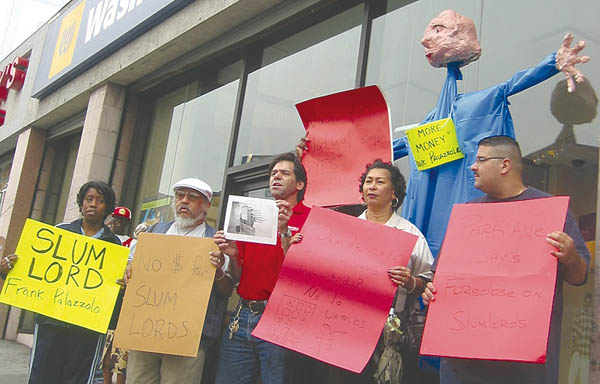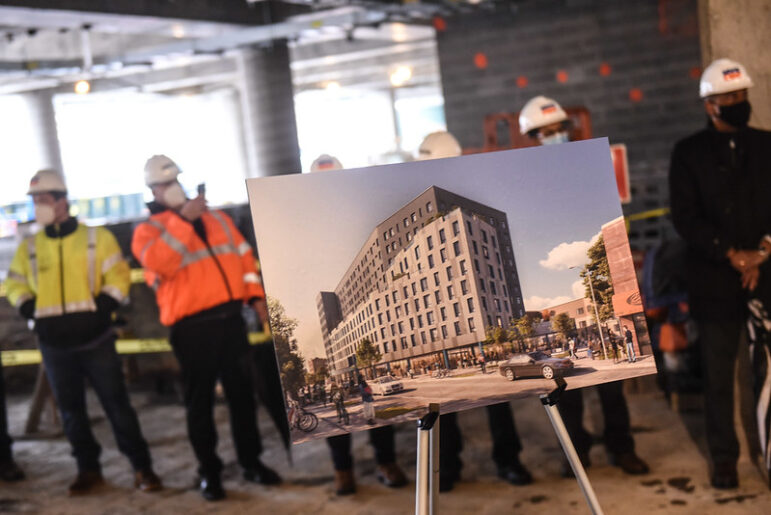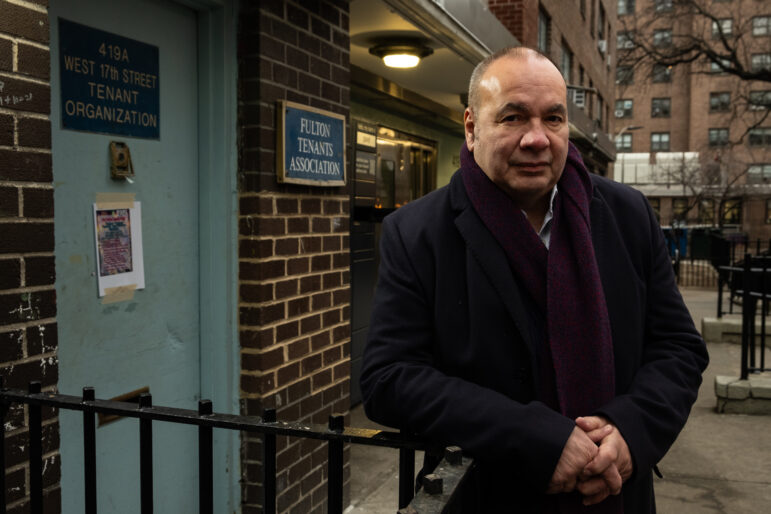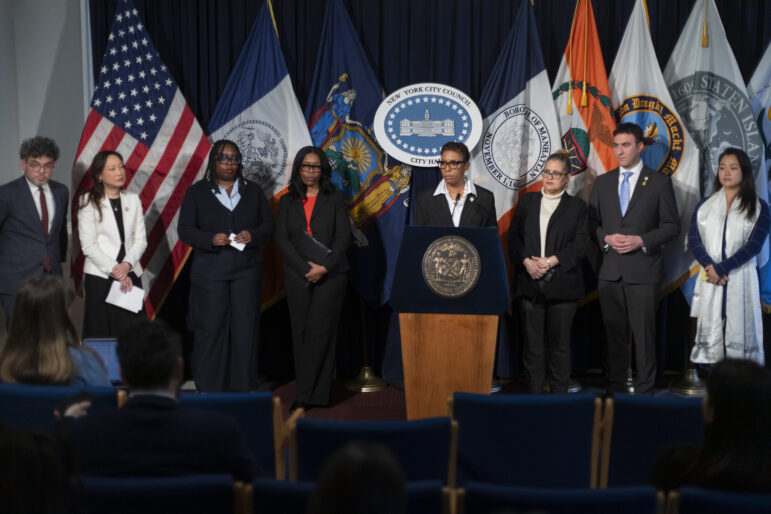
Photo by: Jordan Moss/Norwood News
Members of the Northwest Bronx Community Clergy Coalition protesting Washington Mutual’s dealings with the Palazzolo-linked corporations in 2003. Shortly afterward, some of those corporations sued the group for interfering in its business.
This is a sidebar in a multipart story. Click here to see the rest of the series.
In 2002 reports of deteriorating conditions at buildings owned by landlords based at Palazzolo Plaza began filtering into the offices of the Northwest Bronx Community and Clergy Coalition.
The coalition, formed in 1974, helped Bronx neighborhoods stem the tide of economic and physical devastation in the ’70s and early ’80s. The downside of the revival it helped spur, however, was that renewed private investment in the Bronx’s multifamily rental housing also brought a new crop of rapacious landlords. And the crew operating out of 800 Central Park Avenue in Scarsdale quickly became Exhibit A.
“They were bad buildings,” says Chloe Tribich, an organizer for the coalition at the time. The problems at a 50-unit apartment house at 15–19 West Mosholu Parkway were typical: Tenants were asking for help with caving ceilings, cascading leaks, broken mailboxes and a severe infestation of rodents.
After the August 2002 fatal fire at 3569 DeKalb Avenue, organizers noted that both buildings were owned by corporations housed at Palazzolo Plaza in Scarsdale. According to Mary Dailey, then the coalition’s executive director, a search of property records turned up the huge mortgages obtained by the Palazzolo Investment Group and signed by Frank Palazzolo. Many of the properties included in the mortgages were in similarly dismal shape. The coalition helped form what came to be called the Palazzolo Tenant Committee. The group held protests outside Palazzolo’s palatial home in Westchester County as well as in front of a local branch of Washington Mutual in an effort to get the bank to enforce “good repair” clauses in its mortgages with Palazzolo.
Instead of an offer of negotiations, however, the first response the group received from the landlords was a $1.5 million lawsuit filed in late 2003 by several of the corporate owners based at Palazzolo Plaza. The suit accused the coalition, along with another Bronx housing group, the Highbridge Community Life Center, of trespassing and spreading “false, misleading, libelous, factually incorrect and defamatory” information about the landlords. Among the false claims, the lawsuit stated, were flyers distributed by the coalition claiming that Palazzolo was an owner of the buildings. That was a “misunderstanding,” the suit held. But the alleged misstatements, the landlords asserted, had caused a refinancing deal with Washington Mutual to fall through, costing them $450,000.
The landlords had moved quickly. A judge in Westchester County, where the suit was initially filed, had already signed a restraining order barring the coalition’s organizers from entering Palazzolo-connected properties and from “interfering in any manner” between the landlords and their bank.
Dailey was stunned. “The fact that we could be constrained from helping our neighbors when their ceilings are falling in or accused of trespassing when we go and see these conditions or sued as libelous when he’s known by the media as one of the worst landlords in the city” was “absurd,” she says.
But that didn’t mean it wasn’t effective. Lawyers for the coalition advised it to back off its organizing in Palazzolo-tied properties. “We were being sued for more than a million dollars,” says Dailey. “It was a fairly serious situation.” It wasn’t the first time a large Bronx landlord had used the courts to try to fend off tenant organizers. In 2000 the Rosenberg-Diamond Development Corp. accused the Bronx branch of Acorn, the national citizens’ advocacy group, of libel, slander and extortion in its campaign to force the owners to repair 49 troubled apartment buildings. In that case, the landlords demanded an even bigger price, $16 million. They also won a restraining order—but a much more limited one that permitted organizers to enter the buildings as long as they were accompanied by tenants.
That lawsuit had a similar impact. “It had a chilling effect on the tenant organizing,” says Heather Appel, a former Acorn worker and one of those named in the suit. “It cost us a lot of time and resources that could have been better spent on other issues we were working on. These are poor people’s organizations,” she adds, “and these landlords are corporations that can afford to be in court for years and years.”
The Acorn lawsuit continued for almost three years. It ended in a settlement deal after a judge upheld the group’s right to examine extensive business records for the company. The deal, says Appel, allowed Acorn to continue organizing in the affected buildings.
The Palazzolo lawsuit went on far longer. Lawyers aiding the coalition, including Ray Brescia, an attorney with the nonprofit legal services group Urban Justice Center, and Wendy Stryker, an attorney at the Manhattan firm Frankfurt Kurnit Klein & Selz, combined to first wrestle the lawsuit out of Westchester and into a Bronx courtroom. They also filed a counterclaim asserting that the suit was simply an effort to stifle the coalition’s advocacy. In legalese, they’re known as SLAPP suits, an acronym for Strategic Lawsuit Against Public Participation.
Seven days of hearings were held in 2005, during which bank and city officials testified that their actions with the buildings had been taken independently of the coalition. Stephen Tobia, a Palazzolo associate who owned five of the building corporations named as plaintiffs, also testified. On the stand, Tobia engaged in some Clintonian parsing when asked by Brescia why Palazzolo was signing mortgages listing himself as president of corporations allegedly headed by Tobia.
“This sworn document by Mr. Palazzolo says he is an officer or owner of your properties,” said Brescia.
“It doesn’t say ‘and,’ ” Tobia responded, “it says ‘or.’ ”
Following the hearings, the landlords dropped their trespassing allegation. A year later, the defamation counts were dismissed. When the coalition’s lawyers continued to press their counterclaim, the landlords’ attorneys ceased showing up for hearings. In March 2010, a judge awarded $600,000 in damages to the coalition. An additional $500,000 in court costs was awarded to the coalition’s attorneys last fall. No one, however, has seen a dime of that money, since the corporate entities that filed suit no longer own the properties and have no other assets.
Brescia hasn’t given up. “The courts have spoken, and we’re going to explore every option to ensure we’re going to get it,” he says.
Dailey says she thinks the monetary awards and the coalition’s vigorous response in court might convince other landlords that they shouldn’t be so eager to file suit. “It may be cheaper to make the repairs,” she says.








